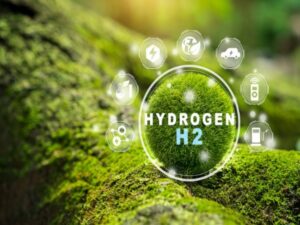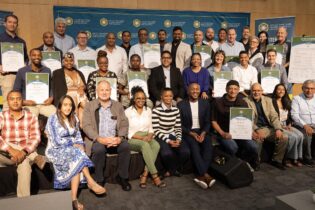The European Union (EU) has committed R628 million (€32 million) in grants to support the development of South Africa’s emerging green hydrogen industry and promote net-zero-related investments across Transnet’s rail, port, and pipeline operations. This funding aims to prepare South Africa for the production and storage of green hydrogen, enhancing its role in the global energy transition.
The new grants complement the EU’s existing Just Energy Transition Partnership with South Africa. The funding was announced by European Commissioner for Energy Kadri Simson during a briefing in Pretoria, where she met with South Africa’s Electricity and Energy Minister, Dr. Kgosientsho Ramokgopa, and Trade, Industry, and Competition Minister, Parks Tau. The grants will be disbursed through EU development finance institutions in partnership with South Africa’s Industrial Development Corporation (IDC), under the framework of a 2013 infrastructure program agreement. While the exact mechanism for distributing the funds has not yet been finalised, Simson confirmed the funding is immediately available. Of the total amount, R490 million is earmarked to accelerate the development of a green hydrogen ecosystem, which is anticipated to leverage an additional R10 billion in private and public funding. This investment will cover the entire value chain, including production, transportation, storage, and downstream industries. An additional R138 million grant will be directed to Transnet, facilitated by the Agence Française de Développement (AFD), to conduct feasibility studies and pilot projects focused on low-carbon hydrogen production and storage. The announcement comes ahead of the EU’s launch of a matchmaking platform in 2025, which aims to connect European green hydrogen buyers with non-European producers, including potential suppliers from South Africa and Namibia. This move is aligned with the EU’s policy of progressively replacing the 10 million tons of grey hydrogen it currently consumes annually with green hydrogen, creating a significant demand for sustainable energy. South Africa’s Trade, Industry, and Competition Minister, Parks Tau, welcomed the funding, expressing the country’s ambition to become a leading producer of green hydrogen and its derivatives. He highlighted South Africa’s potential for green industrialization, including the manufacturing of renewable energy and electrolyzer components. Green hydrogen is produced using renewable electricity to split water into hydrogen and oxygen through an electrolyzer, a process that can include desalinated water. Energy Minister Dr. Kgosientsho Ramokgopa emphasized South Africa’s vision of becoming a global hub for green hydrogen production and noted potential collaboration with neighboring Namibia, which shares similar ambitions. He argued that cooperation through infrastructure and knowledge-sharing could enhance both countries’ competitiveness as investment destinations for green hydrogen. Prior to her visit to South Africa, Commissioner Simson addressed the Global African Hydrogen Summit in Windhoek, Namibia, where she announced three Global Gateway funding initiatives, including a dedicated green-hydrogen investment facility.The European Union (EU) has committed R628 million (€32 million) in grants to support the development of South Africa’s emerging green hydrogen industry and promote net-zero-related investments across Transnet’s rail, port, and pipeline operations. This funding aims to prepare South Africa for the production and storage of green hydrogen, enhancing its role in the global energy transition.
The new grants complement the EU’s existing Just Energy Transition Partnership with South Africa. The funding was announced by European Commissioner for Energy Kadri Simson during a briefing in Pretoria, where she met with South Africa’s Electricity and Energy Minister, Dr. Kgosientsho Ramokgopa, and Trade, Industry, and Competition Minister, Parks Tau. The grants will be disbursed through EU development finance institutions in partnership with South Africa’s Industrial Development Corporation (IDC), under the framework of a 2013 infrastructure program agreement. While the exact mechanism for distributing the funds has not yet been finalized, Simson confirmed the funding is immediately available. Of the total amount, R490 million is earmarked to accelerate the development of a green hydrogen ecosystem, which is anticipated to leverage an additional R10 billion in private and public funding. This investment will cover the entire value chain, including production, transportation, storage, and downstream industries. An additional R138 million grant will be directed to Transnet, facilitated by the Agence Française de Développement (AFD), to conduct feasibility studies and pilot projects focused on low-carbon hydrogen production and storage. The announcement comes ahead of the EU’s launch of a matchmaking platform in 2025, which aims to connect European green hydrogen buyers with non-European producers, including potential suppliers from South Africa and Namibia. This move is aligned with the EU’s policy of progressively replacing the 10 million tons of grey hydrogen it currently consumes annually with green hydrogen, creating a significant demand for sustainable energy. South Africa’s Trade, Industry, and Competition Minister, Parks Tau, welcomed the funding, expressing the country’s ambition to become a leading producer of green hydrogen and its derivatives. He highlighted South Africa’s potential for green industrialization, including the manufacturing of renewable energy and electrolyzer components. Green hydrogen is produced using renewable electricity to split water into hydrogen and oxygen through an electrolyzer, a process that can include desalinated water. Energy Minister Dr. Kgosientsho Ramokgopa emphasized South Africa’s vision of becoming a global hub for green hydrogen production and noted potential collaboration with neighboring Namibia, which shares similar ambitions. He argued that cooperation through infrastructure and knowledge-sharing could enhance both countries’ competitiveness as investment destinations for green hydrogen. Prior to her visit to South Africa, Commissioner Simson addressed the Global African Hydrogen Summit in Windhoek, Namibia, where she announced three Global Gateway funding initiatives, including a dedicated green-hydrogen investment facility.






